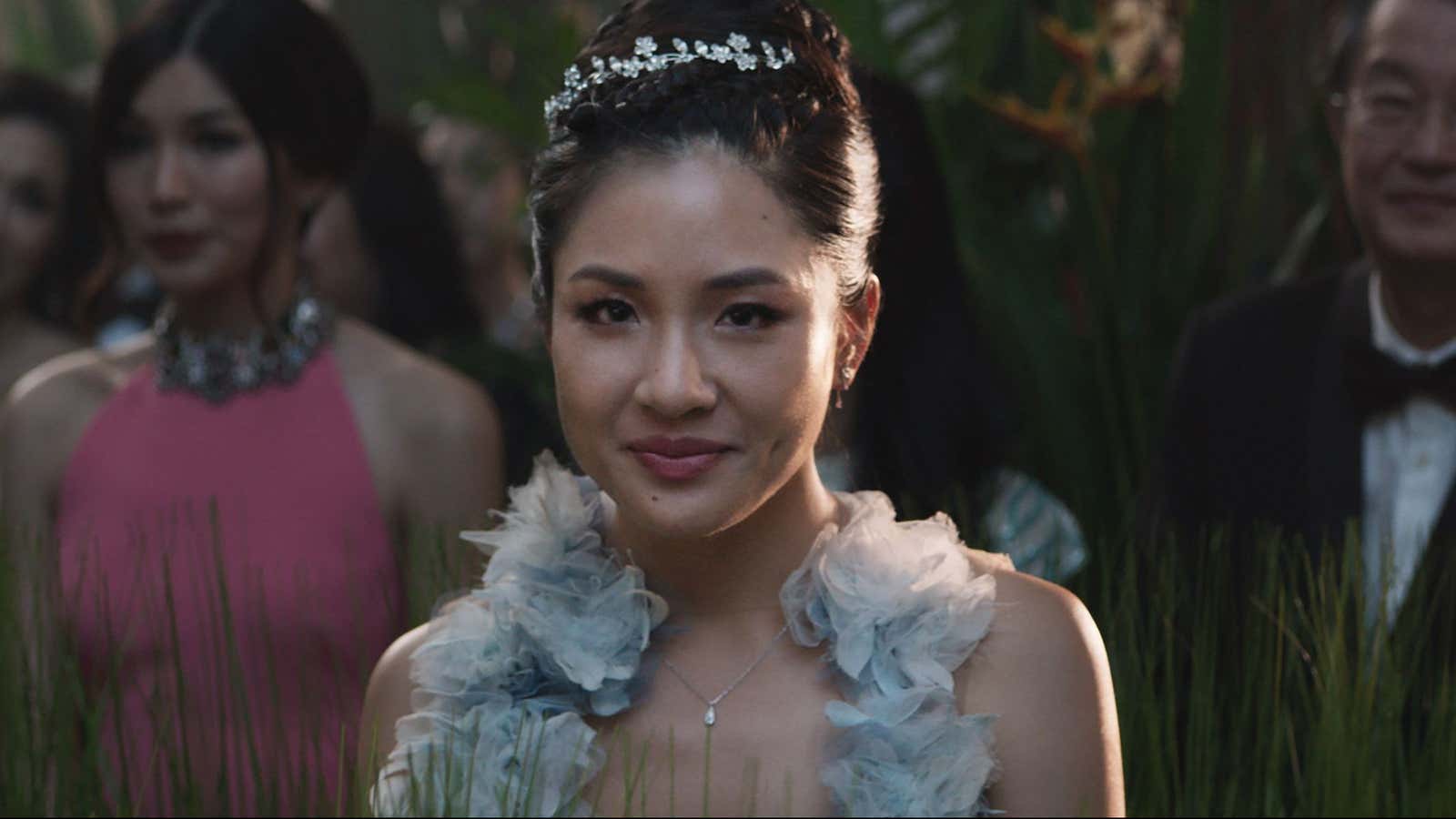The secret weapon of Jon M. Chu’s deliriously entertaining and slyly insightful rom-com Crazy Rich Asians (out today from Warner Bros, and if you haven’t bought your tickets yet, do that now) isn’t Henry Golding, the film’s debonair leading man, in his big-screen debut. It isn’t Constance Wu, the film’s lovably acerbic protagonist. It isn’t even everyone’s fave breakout star this summer, the rapper/actor Awkwafina. Nor is it the luminescent Gemma Chan, the absolutely perfect Michelle Yeoh, or the brilliantly unholy comic trinity of Ken Jeong, Jimmy O. Yang, and Ronny Chieng.
No, the ace card in Crazy Rich Asians‘ loaded hand is its soundtrack, which combines nostalgic Chinese big-band jazz numbers from the swinging sixties with tongue-twisted remakes of American pop classics (a Cantonese-language version of Madonna’s “Material Girl,” anyone?) to weave what Chu calls an “eclectic tapestry of old, new and remixed favorites.”
“I wanted to take hit American songs and make them Chinese, to give audiences a sense of how we feel as Asian Americans,” Chu tells Quartz. “That crazy blend of identities and cultures that makes up who we are. It felt to me like a critical part of what we were trying to do.”
The centerpiece of Chu’s remix playlist is a Chinese version of a song by the British band Coldplay, its first real breakout, titled “Yellow” (video). The name itself was enough to cause head-shaking at Warner Bros, when connected with the first US studio film with an all-Asian cast in 25 years. Though the song is not about race, the term “yellow” is fraught with negative associations: It’s identified with cowardice, with illness, with fake news. For Asians, it’s frequently used as a slur, a reference to the color of Asian skin, used in ominous phrases like “yellow peril.” Chu himself says he remembers being called yellow in a “derogatory way throughout high school.”
Some at the studio were concerned that the song would evoke these stereotypes, Chu says. “They were like, ‘Whoa, we can’t do that, what do you think people will say?’ And I told them, ‘Well, a white director couldn’t do it.'”
He convinced the studio. “All credit to them, I said, ‘Guys trust me on this one’ and they gave in,” laughs Chu. But getting Coldplay on board was harder. The band had been taken to task for cultural appropriation following the lurid video for 2012’s “Princess of China,” which put Rihanna in exotic orientalist drag, and again in 2016’s “Hymn for the Weekend,” which was shot in India during the festival of Holi, and featured Beyonce in traditional Indian garb. Coldplay rejected the request to use “Yellow” as soon as it was submitted.
The rejection prompted Chu to write the band a direct letter, explaining his love for the song, and “complicated relationship” with its title. “For the first time in my life, it described the color in the most beautiful, magical ways,” Chu wrote. “The color of the stars, her skin, the love. It was an incredible image of attraction and aspiration that it made me rethink my own self image.” Allowing him to use the song in the movie, Chu wrote, would give a “a whole generation of Asian-Americans, and others, the same sense of pride I got when I heard your song.”
Within an hour, the band emailed him back, granting him permission. As promised, Chu triumphantly features it, unmistakably Sinified, as the film’s final song, during its protagonist’s climactic moment of self-realization. Sung in Mandarin by the Chinese-American YouTuber and The Voice contestant Katherine Ho, it swells anthemically beneath visuals of protagonist Rachel Chu coming to recognize that she’s strong enough to move forward.
“Yellow” is far from the only gem on the soundtrack. To curate it, the filmmaker dug deep into the sonic archives of a prior generation, Chu says. His parents recognized many of the songs when they heard them, he says—and even knew the words to some. He described their delight, hearing them again: “‘Oh my gosh, this is what we used to do, the jitterbug to in China! I haven’t heard this for so long, where did you get this?’ ‘Well, Mom, there’s this thing called Spotify…'”
For slightly younger audience members, this one included, “Yellow” had a similar effect, triggering the welling up of real tears.
Correction: An earlier version of this article misstated the language that Madonna’s “Material Girl” is sung in on the soundtrack.
